

Over 10K participants sign up for Stanford medical trial after ResearchKit debut. By AppleInsider Staff Wednesday, March 11, 2015, 08:54 am PT (11:54 am ET)
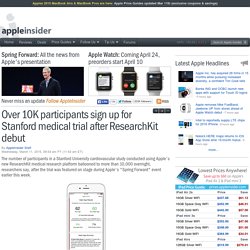
Fitness device makers say engagement, not accuracy, is most important. It seems like everybody’s talking about fitness device accuracy these days.
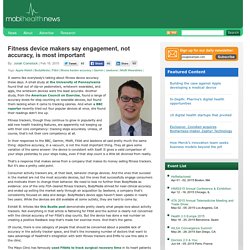
A small study at the University of Pennsylvania found that out of clip-on pedometers, wristworn wearables, and apps, the wristworn devices were the least accurate. Prediction: Health wearables to save 1.3 million lives by 2020. Smart wearable devices may help save 1.3 million lives by 2020, according to a prediction made by Switzerland-based firm Soreon Research.
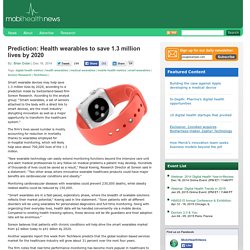
According to the analyst group: “Smart wearables, a set of sensors attached to the body with a direct link to smart devices, are the most industry-disrupting innovation as well as a major opportunity to transform the healthcare system.” The firm’s lives saved number is mostly accounting for reduction in mortality thanks to wearables employed for in-hospital monitoring, which will likely help save about 700,000 lives of the 1.3 million. “New wearable technology can easily extend monitoring functions beyond the intensive care unit and alert medical professionals to any follow-on medical problems a patient may develop. Six month trial finds calorie tracking app too time intensive. Using a smartphone app to monitor weight loss is effective if the user is willing to self-monitor calories, but for most patients, using a health app won’t result in a substantial weight change, according to a UCLA study in the Annals of Internal Medicine of 212 primary care patients.
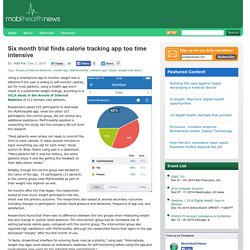
Researchers asked 105 participants to download the MyFitnessPal app, while the other 107 participants, the control group, did not receive any additional assistance. MyFitnessPal assisted in conducting the study, but the company did not fund the research. “Most patients were simply not ready to commit the time to track calories.
It takes several minutes to input everything you eat for each meal,” study author Dr. GlaxoSmithKline is testing mobile health sensors for clinical trials. Pharmaceutical company GlaxoSmithKline is using mobile health tools in a small study — just six subjects — that could lead to there more widespread use in clinical trials.
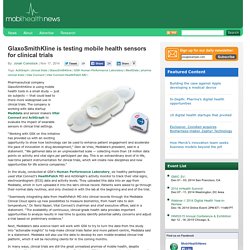
The company is working with data startup Medidata and sensor makers Vital Connect and ActiGraph to evaluate the impact of wearable sensors in clinical trial settings. “Working with GSK on this initiative has provided us with an exciting opportunity to show how technology can be used to enhance patient engagement and accelerate the pace of innovation in drug development,” Glen de Vries, Medidata’s president, said in a statement. “We gathered data on an unprecedented scale — collecting more than 18 million data points on activity and vital signs per participant per day.
Researchers aim to turn wearables into mini hospitals. A small team of researchers from Sentient Science and the University of Buffalo are developing wearables especially for soldiers and high stress-related occupations.
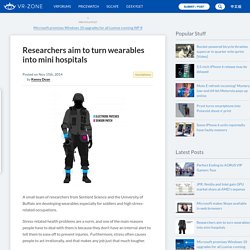
Google Flu Trends will supplement crowdsourced approach with CDC data. Without specifically acknowledging criticisms about its accuracy, Google announced Friday it would be making some changes to Google Flu Trends, the service that uses search data to track and predict flu outcomes in the United States and around the world.
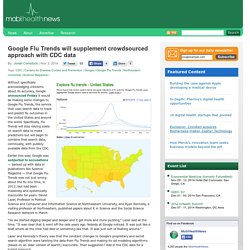
Specifically, Flu Trends will stop relying solely on search data to make predictions but will begin to combine that search data, continually, with publicly available data from the CDC. Earlier this year, Google was subjected to accusations — backed up with data in publications like Science Magazine — that Google Flu Trends was not just wrong about the flu one time, in 2012, but had been massively and systemically inaccurate for years. David Lazer, Professor in Political Science and Computer and Information Science at Northeastern University, and Ryan Kennedy, a visiting professor at Northeastern, published papers about it in Science and the Social Science Research Network in March. Ginger.io is working with UCSF, Duke, Partners on diverse pilots. Ginger.io, a health startup focused on passive data collection through smartphones, announced a number of high profile clinical pilots that have been quietly employing its technology.
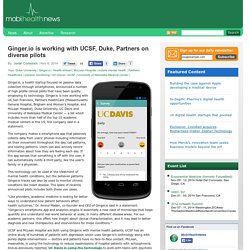
Ginger.io is now working with UC San Francisco, Partners HealthCare (Massachusetts General Hospital, Brigham and Women’s Hospital, and McLean Hospital), Duke University, UC Davis and University of Nebraska Medical Center — a list which includes more than half of the top 10 academic medical centers in the US, the company said in a statement. The company makes a smartphone app that passively collects data from users’ phones including information on their movement throughout the day, call patterns, and texting patterns. Users can also actively record information about how they are feeling each day. Halamka: Time is right for patient-generated data, care traffic controllers needed. Boston’s Beth Israel Deaconess Medical Center is gearing up to get data from patients’ consumer devices like Fitbit, Jawbone UP, or Withings weight scale into their EHR, according to CIO and emergency room physician Dr.
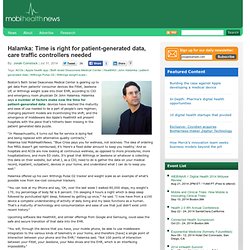
John Halamka. Halamka says a number of factors make now the time for patient-generated data: devices have reached the maturity and ease of use needed to be a part of people’s care regimen; changing payment models are incentivizing the shift; and the emergence of middleware like Apple’s HealthKit will present hospitals with the piece that’s hitherto been missing in the patient generated data puzzle. “In Massachusetts, it turns out fee for service is dying fast and being replaced with alternative quality contracts,” Halamka told MobiHealthNews. RWJF initiative to explore health data in communities. Data for Health co-chairs Dr.
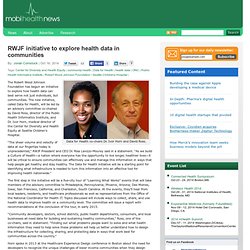
Ivor Horn and David Ross. Stanford launches research center for wearables. Stanford University is launching a new lab designed to pull measurable and meaningful data from wearable devices. The Stanford Center for Medical Mobile Technology is being overseen by Matthew Smuck and Christy Lane, co-founders of Vivametrica, a Canadian company working on an analytics platform for wearables. Lane, an "exercise scientist" who has worked at academic medical institutions in both the United States and Canada, sees the new lab as an opportunity to tie consumer devices to the provider community. "We want to leverage the capabilities of mobile technology for healthcare," she told mHealth News.
Florida Blue grant backs MyFitnessPal, Fitbit-enabled teenage obesity study. Thanks to a $100,000 grant from the philanthropic arm of insurance company Florida Blue, researchers with affiliations to Johns Hopkins Medicine, are launching a study on how tracking devices and apps can help obese teenagers make healthier decisions, according to a Reuters report. The researchers recently visited a high school in Florida to begin recruiting the 50 teenagers it plans to sign up for the study, which will include the use of Fitbit tracking devices and the MyFitnessPal app. Study participants will track their activity and sleep with the Fitbit device, while MyFitnessPal will help them track what they eat. Survey: 74.9 percent of US adults do not track health or fitness with devices or apps.
Close to 75 percent of adults do not use a fitness device or app to track their weight, diet, or exercise, according to a survey of 979 US adults conducted by research firm TechnologyAdvice. The survey found that 11 percent of respondents use a wearable fitness tracker, 14.1 percent use an app to track health, 14.5 percent do not track health but plan to start, and 60.4 percent do not track their health. The surveyors asked a smaller group of respondents, 419 of them, who had said they do not use a device or app to track wellness, why they don’t use them. Some 27.2 percent said they were not interested in tracking health and wellness, 17.7 percent were concerned about the cost of the device, 10.5 percent were concerned about the privacy of their data, 7.9 percent were not happy with the design of trackers, and 43.7 said they didn’t agree with any of the reasons TechnologyAdvice listed for not tracking their health and wellness.
FEATURE-Obesity research takes high-tech twist at Florida school. Study: Smartphone improves diet tracking adherence, but not weight loss. “While no difference in weight loss was noted between the three groups, we found that participants who monitored their diet with either an application or the memo function on a smartphone were more likely to persist in the study and missed fewer days of entering dietary data, compared to those monitoring via paper and pencil,” lead author Christopher Wharton, associate professor of nutrition at ASU’s School of Nutrition and Health Promotion, said in a statement.
“This may be due to ease of use.” The researchers studied a group of 47 volunteers across an 8-week weight loss trial, semi-randomly assigned to three groups. One group did dietary tracking with a pencil and paper, one group did the same kind of tracking in the memo application on the smartphone, and one group used Lose It! , a popular smartphone diet tracking app. Duke, Stanford are also working on HealthKit pilots. According to a report from Reuters, two more large hospitals are embarking on pilots with Apple’s HealthKit: Stanford University Medical Center and Duke University Hospital.
Stanford is using the technology to track blood sugar in children with diabetes, while Duke will be tracking blood pressure and weight for patients with cancer and heart conditions. Does self-tracking lead to better health? Validity of Consumer-Based Physical Activity Monitors : Medicine & Science in Sports & Exercise. Background: Many consumer-based monitors are marketed to provide personal information on the levels of physical activity and daily energy expenditure (EE), but little or no information is available to substantiate their validity.
Wearable device adoption is growing, but engagement still drops after six months. Although one third of consumers who own wearable devices stop using them within six months, the rate of adoption of smart wearable technology has increased, according to a survey of 1,700 device owners from Cambridge, Massachusetts-based Endeavour Partners.
Researchers use iPhone tracking app in yearlong microbiome study. A new longitudinal study of the microbiome from researchers at Harvard and MIT demonstrates how the ubiquity of a smartphone enables research that would have been much more difficult previously. In the study, two patients tracked a number of health factors on an iPhone app for a year and also took stool samples almost every day. A Spanish Pillbox App for Elderly Patients Taking Multiple Medications: Randomized Controlled Trial. Stethoscopes and Smartphones: Physicians Turn to Digital Tools to Boost Patient Outcomes. Survey: One third of docs recommended a health app to patients.
More than a third of US physicians recommended that a patient use a health app, according to the newest addition of Manhattan Research’s Taking the Pulse survey, which details physician mobile and digital health adoption each year. The online survey included 3,066 practicing physicians across a variety of practices. The research group released a smattering of data that suggested physicians’ awareness and engagement with mobile and digital tools is on the rise, and that this is motivated in some part by the trend toward outcomes-based care models.
News: First Study Reveals Weight Loss Apps Could Really Work. In-Depth: Revisiting Topol’s Top Ten Digital Health Targets. Five years ago this month, Scripps Health’s Chief Academic Officer Dr. Eric Topol began a speaking tour about the potential of digital health at a mobile industry event in Las Vegas. Vitality Group: Fitness tracking reduced health risk factors 22 percent. Employee wellness programs have been one of the largest stakeholder groups to see the potential of wearable activity trackers — ever since they hit the scene a few years ago. Hacking Health: How Consumers Use Smartphones and Wearable Tech to Track Their Health. Endeavour-Partners-Wearables-White-Paper-20141. Health apps and wearables are crap (science says so) » Techly. Fitness wearables and their companion apps have been getting a heap of press in recent months.
Consumer devices deliver telehealth in the home. How mobile health is different in China, its second biggest market. Hood's 25 year study. Study: Weight loss apps still aren’t using many established behavior change strategies. Vol-21. Accenture: 43 percent of consumers interested in buying health and fitness monitors. Untitled. Splendid project. On Mobiquity study. Physicians embrace patient S-T.